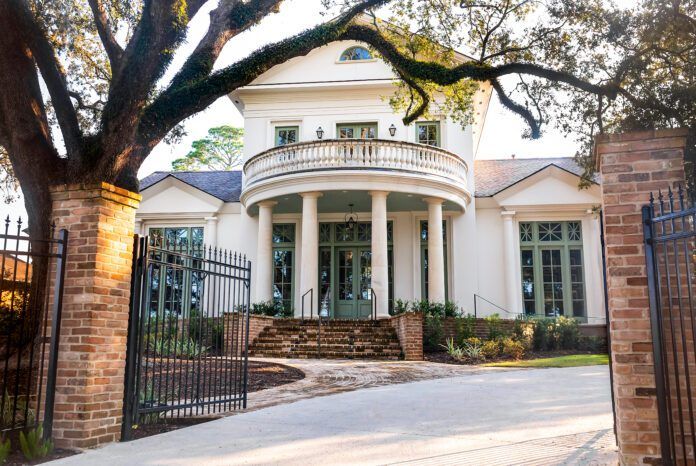Camp tales – Baton Rouge residents remember the allure of summer camps of their youth and wax nostalgic for friendships formed and nights sleeping under the stars
The summer that Julia George Moore was 9 years old, her parents shipped her off to Camp Mountain Lake in Tracey City, Tenn. By herself. For four weeks. Her mom, Beth Courtney, was a capital correspondent; her dad, Steve George, was an attorney for the Louisiana Legislature; and they both spent the first half of June working long, erratic hours covering the legislative session.
“I was an only child,” Moore says. “There were no grandparents around.”
Camp Mountain Lake proved to be a summer camp like no other. Established in 1947, the originally all-boys camp had gone co-ed by 1979, when Moore first attended. But it still retained its rough-and-tumble culture, due in large measure to the tone set by its founder, Horace Moore, the chain-smoking football coach for nearby Sewanee University.
Camp Mountain Lake was an old-school camp. A camper’s camp. The kind of camp that made the summer camps Moore attended in later years—Camp Greystone and Camp Gulf Park—seem like country clubs, resorts.
Campers were doused with stinky green soap to ward off ticks. They were sprayed with red disinfectant to help heal bug bites. They were thrown out of a canoe fully clothed and made to swim ashore. They played war games, where they pelted each other with missiles made from flour-packed tissue packets, and Battle Royale, where they whacked each other with homemade maces.
“They would take these dead tennis balls—and for a tennis ball to be dead at Mountain Lake it had to be really dead—and they would stuff them into the bottom of tube socks,” Moore recalls. “Then, they would tie a knot in the middle and swing them around like projectiles.”
The kids got scuffed up and bruised. They got punished and homesick. And they learned life lessons that they still treasure three decades later.
“I must have loved Camp Mountain Lake,” Moore says. “But I loved it in the same way people love roller coasters and bungee jumping: white-knuckled panic during the experience, but all smiles afterward.”
Like so many of us, Moore relives her camp memories this time every year—the good, the bad and the ugly. We reminisce about the friends, the endless days, eating watermelon while singing camp songs, swimming in streams. We even get nostalgic for stinky green tick repellent.
What is it that makes summer camp so special? Is it the change of scenery? The great outdoors? The special friends? The opportunity, for a precious few weeks, to reinvent yourself in a safe, faraway place?
“It’s all of it,” says Anna Katherine Bardwell, who spent six childhood summers at Camp DeSoto in Mentone, Ala. “I think it’s the experience of being on your own, close to nature, somewhere different, and having structured activities in a wholesome environment where you can make special friends.”
Like Moore, Bardwell has fond memories of her years at summer camp. She was just 11 years old and entering the fifth grade when she made her first trip to DeSoto, via an Amtrak train from New Orleans to Birmingham.
“We had a big group of girls from Baton Rouge, and we would be on the train together for the six- or seven-hour ride to Birmingham,” Bardwell recalls. “One of the counselors would ride the train with us, and then we would take a bus up to the mountains.”
Unlike Mountain Lake, Camp DeSoto had a kinder, gentler feel about it because it was an all-girls camp, and a Christian camp at that. Still, DeSoto was plenty rustic, with open-air cabins and latrines that were a healthy hike down a path from the cabins. Days were filled with endless outdoor mountain activities—horseback riding, archery, hiking and swimming. Nights were spent playing games, performing skits and singing songs.
Bardwell loved it all. But her favorite memories are of the ongoing competitions among the three tribes into which DeSoto divided its campers—the Cherokees, Chickasaws and Creeks.
“Throughout the camp sessions there were different competitions,” Bardwell says. “We had tribe day, for instance, where each tribe would get a day to decorate the camp and put on a skit. We had athletic competitions. We had spirit competitions, and at the end of camp, whichever tribe had the most points won.”
Tribes were no small thing at Camp DeSoto. Once assigned, campers belonged to tribes for life. Their siblings—and a generation later, their children—were automatically assigned to the same tribe, a distinction which gave tribal membership a certain cache.
“I was a Cherokee,” says Bardwell, whose daughter, is going to DeSoto this year for the first time. “Now she will be a Cherokee, too.”
They didn’t have tribes at all-girls Camp Green Cove in Tuxedo, N.C., where Aza Bolin spent several of her childhood summers. Rather, the camp experience there was built around each camper’s goals for herself.
“The focus was really on your personal goals, so at the beginning of camp you sat down and really focused on what you wanted to accomplish for that session,” Bolin says. “You might want to go on a three-night overnighter for mountaineering. … Whatever it was, they made sure it was lofty enough for you, and then you were responsible to really push yourself.”
There were a lot of activities from which to choose, all very different from the outdoor activities Bolin grew up doing in her native Alexandria.
“Rock climbing, canoeing, kayaking, white-water rafting—all sorts of mountain-type activities,” she says. “The environment, the topography, the cool nights—it was such a welcome change from Louisiana.”
One aspect of camp that Bolin particularly enjoyed was the opportunity to meet new people. All of her closest friends went to a different camp in North Carolina, so at Green Cove she was forced to make new friends.
“I really just created a completely different set of friends every summer,” she says. “It was amazing.”
Bonds forged at summer camp are indeed lasting. Bardwell already had a best friend going with her to Camp DeSoto—Caroline Blitzer. But while there, the two Baton Rouge girls made friends with two best friends from Lafayette. The four became a close-knit group and stayed in touch for years.
Moore likewise made close friends at Camp Mountain Lake. As it turns out, many kids from Baton Rouge went there, even though Moore did not realize it as a 9-year-old. Over the years, they all became close, their bonds strengthened by experiences like the weekly convocation of the Kangaroo Court or the Sunday Soup dinners, made of all the leftovers from the previous week’s meals.
“It is funny to still run into people who attended camp there—and there are plenty from Baton Rouge,” says Moore. “The experiences that made Camp Mountain Lake such a unique camp are also unique to its time. You can only smile, shake your head, and wax nostalgic for a time and place that no longer exist.”
While summer camp is a distant memory for most of us, it’s a more recent memory for Garrett Graves. The chairman of the Louisiana Coastal Restoration and Protection Authority spent 16 summers as an adult at summer camps, first at the Tuxedo, N.C., -brother camp of Green Cove—Camp Mondamin, where he was an instructor in various outdoor activities—and then as a leader for Adventure Trek, which takes adults on rustic camping and mountaineering excursions.
As a kid, Graves did not experience summer camp in the mountains or on a lake. Instead, he went to soccer camps and other day camps in the city. But when he was 18, he took a summer job as a counselor at Mondamin, where he headed up the camp’s mountaineering program and also taught mountain biking.
Though a good bit of on-the-job training was involved, Graves was a natural and knew he had found his element. He went back every summer from 1990 to 1995, and still treasures the experience of helping campers encounter nature intensively for the first time.
“We had kids from all over, and we would take them on a seven-day backpacking trip. And after two days everybody stinks and everybody is ugly, and that is where you would kind of peel back the onion and get to know the real person,” he says. “And you would see them realize, I don’t need my phone or my makeup or my video games. And just those ‘oh wow’ moments were the greatest and most rewarding experiences ever.”
Graves enjoyed it so much that in 1996 he joined Adventure Trek as an instructor, escorting adults on month-long excursions in the Rockies, helping them to experience “oh wow” moments of their own while encamped on the side of a mountain.
“It was great,” says Graves, who worked for Adventure Trek until 2006. “You meet at the airport, a bunch of people you’ve never seen before, jump in the trailer and go. You do not have a camp. You literally live in a tent for a month. It’s just the bare essentials.”
The simplicity of camping and the pleasures that come from the outdoor experience are ultimately what make so many of us look fondly on our days at summer camp. Bolin says it has shaped her life and the way she now teaches her kids about nature and the outdoors.
Every summer, in fact, she and her husband, Tim, vacation with their children at a different national park. So far they’ve been to Olympia National Park in Washington, National Sand Dunes Park in Colorado, and the Great Smoky Mountains National Park, which they hit this summer on their way to bring their sons, for the first time, to Camp Mondamin.
“My camp experience has really influenced me in a way that has trickled down into how I teach my kids about the outdoors and what is important to me as a person,” Bolin says. “It’s really special.”











